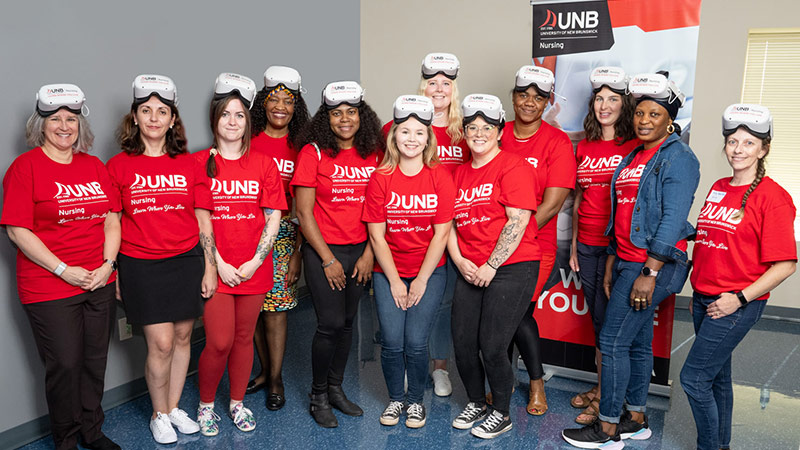How virtual reality can help address the nursing shortage in N.B.
Author: Kayla Cormier
Posted on Jan 24, 2024
Category: UNB Fredericton , UNB Saint John

The University of New Brunswick (UNB) is taking a cutting-edge approach to reversing the nursing shortage in the province with its new program, Learn Where You Live (LWYL).
In this predominantly virtual program, New Brunswick-based licensed practical nurses (LPNs) working toward their bachelor of nursing (BN) can complete their education from anywhere in the province.
Previously, these students would have been required to move or travel to Fredericton to complete their degrees. It’s a first-of-its-kind program for nurses in the province.
Students of the LWYL pathway complete their coursework virtually, while the in-person clinical placements are completed in their home community (currently Moncton and Miramichi) through a partnership with Horizon Health Network. An exciting offering exclusive to this program is the use of immersive virtual reality (VR) using head-mounted displays to complete simulation learning.
The program is growing, and the faculty of nursing is working to make it available in Restigouche, the Upper River Valley region, and potentially different parts of the province as capacity and interest allows.
“The Learn Where You Live program is highly innovative and incredibly ambitious,” said Renée Gordon, teaching professor in the faculty of nursing and the VR project lead for LWYL. “The proof is in the concept: we are reimagining what learning can look like. While there will inevitably be kinks as we work out the process, it's a big, ambitious step for the university. We are leaders in the world of VR learning in higher education in Canada. That’s something to be proud of.”
The faculty of nursing has partnered with UNB’s Spatial Computing Education, Training & Research Laboratory (SPECTRAL) on the VR component of the program.
SPECTRAL is an applied research centre within UNB’s faculty of computer science. They collaborate with research and development partners in developing VR, augmented reality and mixed reality technologies to enhance the way organizations learn, work and live. Their applications span education, healthcare, aerospace and more.
For the LWYL program, SPECTRAL consulted on the selection of software and hardware, procured the VR equipment and supported the development of an Information Technology Services plan to ensure students and faculty have access to technical support.
In August 2023, there were program launch events in Moncton and Miramichi, where students were provided Meta Quest 2 headsets with on-demand clinical simulation software. Students were also provided an orientation to the equipment. The fall 2023 semester was considered a soft launch for the integration of immersive VR simulation, which went well overall.
When students put on their headsets, they are transported to simulated clinical settings - usually hospital rooms - and immersed in well-acted scenarios for their learning.
“There are real advantages to VR education,” says Dr. Scott Bateman, director of SPECTRAL. “Not only can students do their learning from home, but the software and dialogue are standardized, ensuring equal education across the board. Students can actively participate in realistic medical scenarios that enhance learning and provide hands-on training in a safe and controlled environment.”
In lieu of in-person simulations, where students learn about and engage in scenario-based learning on mannequins, the VR program provides a similar experience in a virtual setting while still being supported by faculty through guided discussions and reflection to solidify their learning. Skills practiced in VR simulations serve to augment clinical placements: real-world experiential learning where students get hands-on experience caring for people.
So far, the VR program has been well received and has proven highly effective in preparing students for real-life client care.
“I thought I would miss the in-person classroom experience, but I love having the ability to work at my own pace... and I was able to stay in Moncton close to family,” says Kelly Kydd, a Moncton-based student in their third year.
“The VR headset is very cool,” she said. “It allows you figure out a care strategy while under the safety of a virtual world. Even though you know it's not real, the VR can evoke feelings of panic and distress that you need to make the right decisions for the patient. I was shocked about that part. It helps prepare you to understand what it will be like to be in charge of making those decisions.”
The paradox at the heart of this partnership is that despite the technology, it takes a more human-centred approach. The program meets students where they are, so they do not need to disrupt their lives and families to move to a new city.
UNB has a considerable role to play in addressing the province-wide nursing shortage and the LWYL program, with its innovative use of technology, is one of the ways it is tackling this problem.
By offering more accessible nursing programs like LWYL, UNB is working to boost enrolment province-wide and to get more registered nurses in our healthcare system here at home.
“There is a place at the table for VR learning in the future of higher education,” says Dr. Bateman. “In the case of LWYL, the pathway to nursing has been made more accessible to many potential registered nurses from remote parts of the province. This is what spatial computing can do.”
The University of New Brunswick (UNB) is home to transformative teaching in more than 100 innovative and interdisciplinary programs. Over the next four weeks, we will share stories that showcase how some of these programs help students define their purpose and shape their future by gaining the skills the world needs now.
Other stories in the series:
Legal Innovation Lab leading digital transformation of N.B.’s justice system
